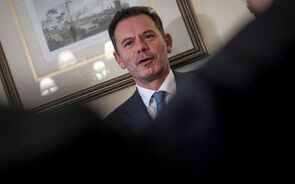All eyes on Greenspan
1 Mensagem
|Página 1 de 1
All eyes on Greenspan
Federal Reserve Chairman Alan Greenspan gets another chance to make peace with Wall Street today.
As the Fed's policy-making Open Market Committee meets today, what Greenspan & Co. have to say will be at least as important as what they do -- if anything -- about interest rates.
Much attention will be on the FOMC's post-meeting news release to see if its language is any clearer than it was last spring, when ambiguous comments led to a bond market bubble that ended in a crash.
The Fed has faced a stream of criticism about the way it uses the king's English. To their credit, Fed governors and senior officials have acknowledged the problem.
Greenspan, of course, is famous for his seemingly obtuse, academic phraseology in speeches and testimony before Congress.
"His language is intentionally clinical, tortured and oblique, so as to minimize the disruptive effect of his words," write David Sicilia and Jeffrey Cruikshank in their book about the chairman, "The Greenspan Effect."
But in this time of heightened corporate scrutiny due to accounting scandals, straight-to-the-point language -- transparency -- has become more important than ever. For the Fed, that means how much it tells the public about what it does, how it sees the economy and what policy moves it is likely to make next.
It's an old issue that came to a head in May. The FOMC's news release was widely interpreted as a warning that deflation had become an economic risk, and suggested the Fed was ready to use "unconventional" tactics to deal with it.
One of those tactics -- buying long-term Treasury bonds to hold down interest rates -- ignited a massive buying rally in the bond market from March to June. That was the bubble.
"However, signs began to emerge that there was not much bite behind the Fed's bark," Dorsey Farr, senior economist with Balentine & Co., an Atlanta wealth management firm, explained in an analysis of the event.
When Greenspan later indicated in congressional testimony that unconventional tactics might not be needed, the bubble burst in June as disappointed investors dumped their bonds.
This sent bond rates -- which move opposite to price -- sharply higher.
Rising bond rates in turn complicated other financial markets, since attractive bond yields are a competitive threat to stocks. And at some point, rising rates might also endanger the economic recovery, in this view.
"Investors blame the Fed chief for misleading the markets about the threat of deflation and the central bank's likely response to it," Business Week's Fed watcher, Rich Miller, asserted. "The result has been a loss of Fed credibility."
As economist Farr sees it, the Fed made its job more difficult than it needed to "by issuing confusing and seemingly contradictory statements."
Greenspan and other Fed members have struggled to persuade the markets that they really will hold interest rates down for at least the immediate future -- presumably well into next year.
Fed Governor Ben Bernanke said in a recent Bloomberg News forum that the Fed won't need to raise rates soon since "there is a reasonable chance of further disinflation in 2004."
By: Tom Walker
Publicado em: 16/09/03
As the Fed's policy-making Open Market Committee meets today, what Greenspan & Co. have to say will be at least as important as what they do -- if anything -- about interest rates.
Much attention will be on the FOMC's post-meeting news release to see if its language is any clearer than it was last spring, when ambiguous comments led to a bond market bubble that ended in a crash.
The Fed has faced a stream of criticism about the way it uses the king's English. To their credit, Fed governors and senior officials have acknowledged the problem.
Greenspan, of course, is famous for his seemingly obtuse, academic phraseology in speeches and testimony before Congress.
"His language is intentionally clinical, tortured and oblique, so as to minimize the disruptive effect of his words," write David Sicilia and Jeffrey Cruikshank in their book about the chairman, "The Greenspan Effect."
But in this time of heightened corporate scrutiny due to accounting scandals, straight-to-the-point language -- transparency -- has become more important than ever. For the Fed, that means how much it tells the public about what it does, how it sees the economy and what policy moves it is likely to make next.
It's an old issue that came to a head in May. The FOMC's news release was widely interpreted as a warning that deflation had become an economic risk, and suggested the Fed was ready to use "unconventional" tactics to deal with it.
One of those tactics -- buying long-term Treasury bonds to hold down interest rates -- ignited a massive buying rally in the bond market from March to June. That was the bubble.
"However, signs began to emerge that there was not much bite behind the Fed's bark," Dorsey Farr, senior economist with Balentine & Co., an Atlanta wealth management firm, explained in an analysis of the event.
When Greenspan later indicated in congressional testimony that unconventional tactics might not be needed, the bubble burst in June as disappointed investors dumped their bonds.
This sent bond rates -- which move opposite to price -- sharply higher.
Rising bond rates in turn complicated other financial markets, since attractive bond yields are a competitive threat to stocks. And at some point, rising rates might also endanger the economic recovery, in this view.
"Investors blame the Fed chief for misleading the markets about the threat of deflation and the central bank's likely response to it," Business Week's Fed watcher, Rich Miller, asserted. "The result has been a loss of Fed credibility."
As economist Farr sees it, the Fed made its job more difficult than it needed to "by issuing confusing and seemingly contradictory statements."
Greenspan and other Fed members have struggled to persuade the markets that they really will hold interest rates down for at least the immediate future -- presumably well into next year.
Fed Governor Ben Bernanke said in a recent Bloomberg News forum that the Fed won't need to raise rates soon since "there is a reasonable chance of further disinflation in 2004."
By: Tom Walker
Publicado em: 16/09/03
Surfer
1 Mensagem
|Página 1 de 1
Quem está ligado:
Utilizadores a ver este Fórum: Bing [Bot], Carrancho_, Google Adsense [Bot], malakas, Manchini888, Mavericks7, MR32, Nietz19, nunorpsilva, O Magriço, OCTAMA, PAULOJOAO, record4995, Shimazaki_2 e 69 visitantes


